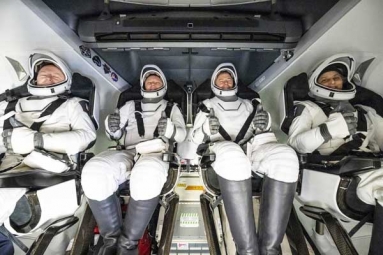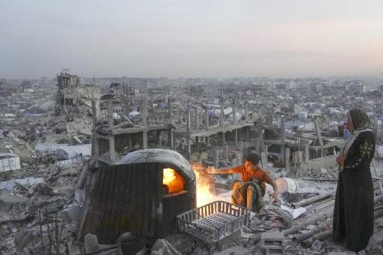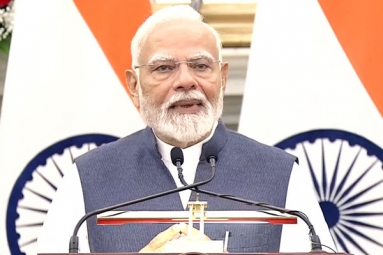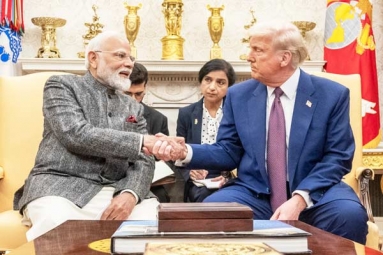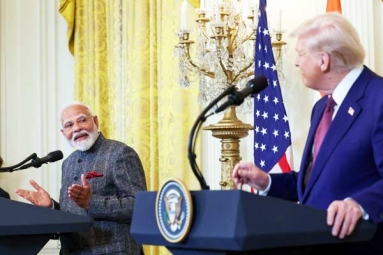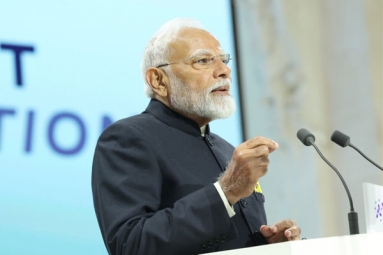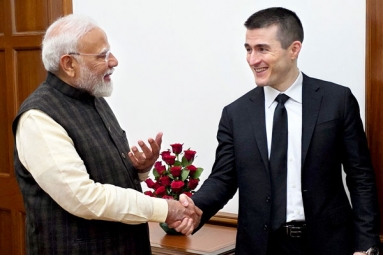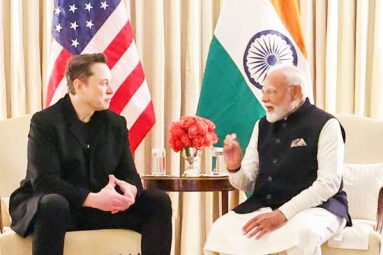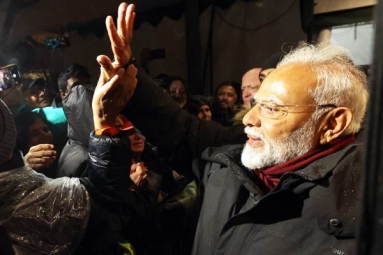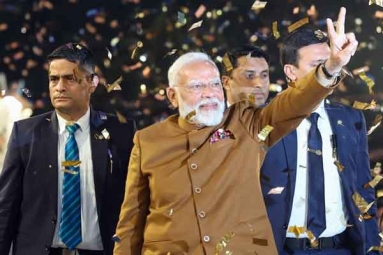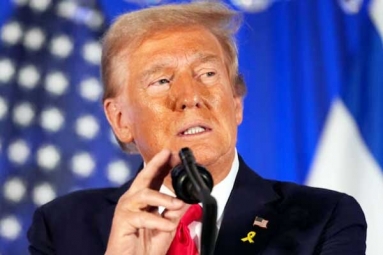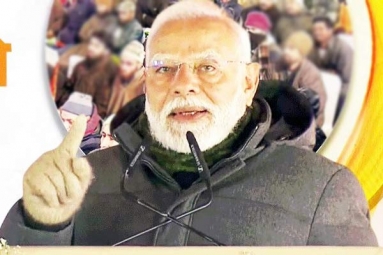Proud moment for Indians! PM Modi addresses Joint Session of US Congress
June 09, 2016 12:52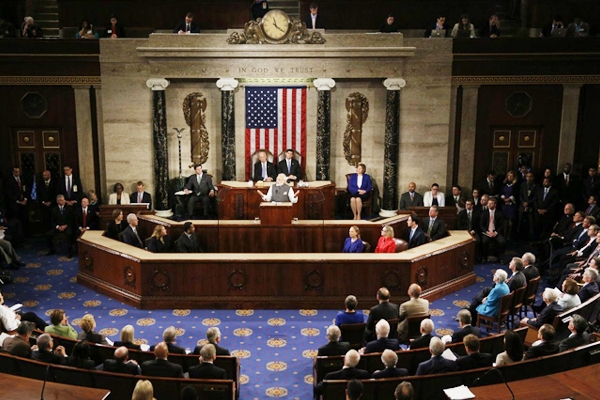
Prime Minister Narendra Modi addressed the joint session of the US Congress. Modi stressed on deeper ties with the US, describing it as an “indispensable partner.” Top US lawmakers describe Modi’s address, as “insightful”.
The 65-year-old Modi became the fifth Indian Prime Minister to address a joint session of the US Congress. He combined poetry, rhetoric and humour to outline his vision for India’s partnership with the U.S in the 21st century.
Read the full text of Modi's speech at US Congress.
Mr. Speaker,
Mr. Vice President,
Distinguished Members of the U.S. Congress
Ladies and Gentlemen.
I am deeply honoured by the invitation to address this Joint Meeting of the U.S. Congress.
Thank you, Mr. Speaker for opening the doors of this magnificent Capitol.
This temple of democracy has encouraged and empowered other democracies the world over.
It manifests the spirit of this great nation, which in Abraham Lincoln's words, "was conceived in liberty and dedicated to the proposition that all men are created equal."
In granting me this opportunity, you have honoured the world's largest democracy and its 1.25 billion people.
As a representative of world's largest democracy, it is indeed a privilege to speak to the leaders of its oldest.
Mr. Speaker,
Two days ago, I began my visit by going to the Arlington National Cemetery -the final resting place of many brave soldiers of this great land.
I honoured their courage and sacrifice for the ideals of freedom and democracy.
It was also the seventy-second Anniversary of the D-Day.
On that day, thousands from this great country fought to protect the torch of liberty on the remote shores of a land that they did not know.
They sacrificed their lives so that the world lives in freedom.
I applaud …India applauds, the great sacrifices of the men and women from 'The Land of the Free and the Home of the Brave' in service of mankind.
India knows what this means because our soldiers too have fallen in distant battlefields for the same ideals.
That is why the threads of freedom and liberty form a strong bond between our two democracies.
Mr. Speaker,
Our nations may have been shaped by differing histories, cultures, and faiths.
Yet, our belief in democracy for our nations and liberty for our countrymen is common.
The idea that all citizens are created equal is a central pillar of the American constitution.
Our founding fathers too shared the same belief and sought individual liberty for every citizen of India.
There were many who doubted India when, as a newly independent nation, we reposed our faith in democracy.
Indeed, wagers were made on our failure.
But, the people of India did not waver.
Our founders created a modern nation with freedom, democracy, and equality as the essence of its soul.
And, in doing so, they ensured that we continued to celebrate our age old diversity.
Today, across its streets and institutions, in its villages and cities, anchored in equal respect for all faiths; and in the melody of hundreds of its languages and dialects.
India lives as one; India grows as one; India celebrates as one.
Mr. Speaker,
Modern India is in its 70th year.
For my government, the Constitution is its real holy book.
And, in that holy book, freedom of faith, speech and franchise, and equality of all citizens, regardless of background, are enshrined as fundamental rights.
800 million of my countrymen may exercise the freedom of franchise once every five years.
But, all the 1.25 billion of our citizens have freedom from fear, a freedom they exercise every moment of their lives.
Distinguished Members,
Engagement between our democracies has been visible in the manner in which our thinkers impacted one another, and shaped the course of our societies.
Thoreau's idea of civil disobedience influenced our political thoughts.
And, similarly the call by the great sage of India Swami Vivekananda to embrace humanity was most famously delivered in Chicago.
Gandhi's non-violence inspired the heroism of Martin Luther King.
Today, a mere distance of 3 miles separates the Martin Luther King memorial at Tidal Basin from the statue of Gandhi at Massachusetts Avenue.
This proximity of their memorials in Washington mirrors the closeness of ideals and values they believed in.
The genius of Dr. B.R. Ambedkar was nurtured in the years he spent at the Columbia University a century ago.
The impact of the U.S. constitution on him was reflected in his drafting of the Indian constitution some three decades later.
Our independence was ignited by the same idealism that fuelled your struggle for freedom.
No wonder then that former Prime Minister of India Atal Bihari Vajpayee called India and the U.S. 'natural allies'.
No wonder that the shared ideals and common philosophy of freedom shaped the bedrock of our ties.
No wonder then, that President Obama has called our ties the defining partnership of the 21st century.
Video:
Mr. Speaker,
More than fifteen years ago, Prime Minister of India, Atal Bihari Vajpayee stood here and gave a call to step out of the 'shadow of hesitation' of the past.
The pages of our friendship since then tell a remarkable story.
Today, our relationship has overcome the hesitations of history.
Comfort, candour and convergence define our conversations.
Through the cycle of elections and transitions of Administrations the intensity of our engagements has only grown.
And, in this exciting journey, the U.S. Congress has acted as its compass.
You helped us turn barriers into bridges of partnership.
In the fall of 2008, when the Congress passed the India-U.S. Civil Nuclear Cooperation Agreement, it changed the very colours of leaves of our relationship.
We thank you for being there when the partnership needed you the most.
You have also stood by us in times of sorrow.
India will never forget the solidarity shown by the U.S. Congress when terrorists from across our border attacked Mumbai in November of 2008.
And for this, we are grateful.
Mr. Speaker,
I am informed that the working of the U.S. Congress is harmonious.
I am also told that you are well-known for your bipartisanship.
Well, you are not alone.
Time and again, I have also witnessed a similar spirit in the Indian Parliament, especially in our Upper House.
So, as you can see, we have many shared practices.
Mr. Speaker,
As this country knows well, every journey has its pioneers.
Very early on, they shaped a development partnership even when the meeting ground was more limited.
The genius of Norman Borlaug brought the Green Revolution and food security to India.
The excellence of the American Universities nurtured Institutes of Technology and Management in India.
And, I could go on.
Fast forward to today.
The embrace of our partnership extends to the entirety of human endeavour-from the depths of the oceans to the vastness of the space.
Our S&T collaboration continues to helps us in cracking the age-old problems in the fields of public health, education, food, and agriculture.
Ties of commerce and investment are flourishing. We trade more with the U.S. than with any other nation.
And, the flow of goods, services and capital between us generates jobs in both our societies. As in trade, so in defence. India exercises with the
United States more than we do with any other partner. Defence purchases have moved from almost zero to ten billion dollars in less than a decade.
Our cooperation also secures our cities and citizens from terrorists, and protects our critical infrastructure from cyber threats.
Civil Nuclear Cooperation, as I told President Obama yesterday, is a reality.
Mr. Speaker,
Our people to people links are strong; and there is close cultural connect between our societies.
SIRI tells us that India's ancient heritage of Yoga has over 30 million practitioners in the U.S..
It is estimated that more Americans bend for yoga than to throw a curve ball.
And, no Mr. Speaker, we have not yet claimed intellectual property right on Yoga.
Connecting our two nations is also a unique and dynamic bridge of three million Indian Americans.
Today, they are among your best CEOs; academics; astronauts; scientists; economists; doctors; even spelling bee champions.
They are your strength. They are also the pride of India. They symbolize the best of both our societies.
Mr. Speaker,
My understanding of your great country began long before I entered public office.
Long before assuming office, I travelled coast to coast, covering more than 25 States of America.
I realized then that the real strength of the U.S. was in the dreams of its people and the boldness of their ambitions.
Today, Mr. Speaker, a similar spirit animates India.
Our 800 million youth, especially, are particularly impatient.
India is undergoing a profound social and economic change.
A billion of its citizens are already politically empowered.
My dream is to economically empower them through many social and economic transformations.
And, do so by 2022, the seventy-fifth anniversary of India's independence.
My to-do list is long and ambitious. But you will understand.
It includes:
• A vibrant rural economy with robust farm sector;
• A roof over each head and electricity to all households;
• To skill millions of our youth;
• Build 100 smart cities;
• Have a broad band for a billion, and connect our villages to the digital world;
• And create a twenty-first century rail, road and port infrastructure.
These are not just aspirations; they are goals to be reached in a finite time-frame.
And, to be achieved with a light carbon foot print, with greater emphasis on renewables.
Mr. Speaker,
In every sector of India's forward march, I see the U.S. as an indispensable partner.
Many of you also believe that a stronger and prosperous India is in America's strategic interest.
Let us work together to convert shared ideals into practical cooperation.
There can be no doubt that in advancing this relationship, both nations stand to gain in great measure.
As the U.S. businesses search for new areas of economic growth, markets for their goods, a pool of skilled resources, and global locations to produce and manufacture, India could be their ideal partner.
India's strong economy, and growth rate of 7.6% per annum, is creating new opportunities for our mutual prosperity.
Transformative American technologies in India and growing investment by Indian companies in the United States both have a positive impact on the lives of our citizens.
Today, for their global research and development centres, India is the destination of choice for the U.S. companies.
Looking eastward from India, across the Pacific, the innovation strength of our two countries
comes together in California.
Here, the innovative genius of America and India's intellectual creativity are working to shape new industries of the future.
Mr. Speaker,
The 21st century has brought with it great opportunities.
But, it also comes with its own set of challenges.
Inter-dependence is increasing.
But, while some parts of the world are islands of growing economic prosperity; other are mired in conflicts.
In Asia, the absence of an agreed security architecture creates uncertainty.
Threats of terror are expanding, and new challenges are emerging in cyber and outer-space.
And, global institutions conceived in 20th century, seem unable to cope with new challenges or take on new responsibilities.
In this world full of multiple transitions and economic opportunities; growing uncertainties and political complexities; existing threats and new challenges; our engagement can make a difference by promoting:
• Cooperation not dominance;
• Connectivity not isolation;
• Respect for Global Commons;
• inclusive not exclusive mechanisms; and above all
• adherence to international rules and norms.
India is already assuming her responsibilities in securing the Indian Ocean region.
A strong India-U.S. partnership can anchor peace, prosperity and stability from Asia to Africa and from Indian Ocean to the Pacific.
It can also help ensure security of the sea lanes of commerce and freedom of navigation on seas.
But, the effectiveness of our cooperation would increase if international institutions framed with the mindset of the 20th century were to reflect the realities of today.
Mr. Speaker,
Before arriving in Washington D.C., I had visited Herat in Western Afghanistan to inaugurate Afghan-India Friendship Dam, a 42 MW hydro-electric project built with Indian assistance. I was also there on the Christmas day last year to dedicate to that proud nation its Parliament, a testimony to our democratic ties.
Afghans naturally recognize that the sacrifices of American have helped create a better life.
But, your contribution in keeping the region safe and secure is deeply appreciated even beyond.
India too has made an enormous contribution and sacrifices to support our friendship with Afghan people.
A commitment to rebuild a peaceful, and stable and prosperous Afghanistan our shared objective.
Yet, Distinguished Members, not just in Afghanistan, but elsewhere in South Asia, and globally, terrorism remains the biggest threat.
In the territory stretching from West of India's border to Africa, it may go by different names, from Laskhar-e-Taiba, to Taliban to ISIS.
But, it’s philosophy is common: of hate, murder and violence.
Although it's shadow is spreading across the world, it is incubated in India's neighbourhood.
I commend the members of the U.S. Congress for sending a clear message to those who preach and practice terrorism for political gains.
Refusing to reward them is the first step towards holding them accountable for their actions.
The fight against terrorism has to be fought at many levels.
And, the traditional tools of military, intelligence or diplomacy alone would not be able to win this fight.
Mr. Speaker,
We have both lost civilians and soldiers in combating it.
The need of the hour is for us to deepen our security cooperation.
And, base it on a policy:
• that isolates those who harbour, support and sponsor terrorists;
• that does not distinguish between "good" and "bad" terrorists; and that delinks religion from terrorism.
Also, for us to succeed, those who believe in humanity must come together to fight for it as one, and speak against this menace in one voice.
Terrorism must be delegitimized.
Mr. Speaker,
The benefits of our partnership extend not just to the nations and regions that need it most.
On our own, and by combining our capacities, we are also responding to other global challenges including when disaster strikes and where humanitarian relief is needed.
Far from our shores, we evacuated thousands from Yemen, Indians, Americans and others.
Nearer home, we were the first responders during Nepal's earthquake, in the Maldives water crisis and most recently during landslide in Sri Lanka.
We are also one of the largest contributors of troops to UN Peace Keeping Operations.
Often, India and the U.S. have combined their strengths in science, technology and innovation to help fight hunger, poverty, diseases and illiteracy in different parts of the world.
The success of our partnership is also opening up new opportunities for learning, security and development from Asia to Africa.
And, the protection of environment and caring for the planet is central to our shared vision of a just world.
For us in India, to live in harmony with mother earth is part of our ancient belief.
And, to take from nature only what is most essential is part of our civilizational ethos.
Our partnership, therefore, aims to balance responsibilities with capabilities.
And, it also focuses on new ways to increase the availability and use of renewable energy.
A strong U.S. support for our initiative to form an International Solar Alliance is one such effort.
We are working together not just for a better future for ourselves, but for the whole world.
This has also been the goal of our efforts in G-20, East Asia Summit and Climate Change summits.
Mr. Speaker and Distinguished Members
As we deepen our partnership, there would be times when we would have differing perspectives.
But, since our interests and concerns converge, the autonomy in decision making and diversity in our perspectives can only add value to our partnership.
So, as we embark on a new journey, and seek new goals, let us focus not just on matters routine but transformational ideas.
Ideas which can focus:
• Not just on creating wealth but also creating value for our societies;
• Not just on immediate gains but also long term benefits;
• Not just on sharing best practices but also shaping partnerships; and
• Not just on building a bright future for our peoples, but in being a bridge to a more united, humane and prosperous world.
And, important for the success of this journey would be a need to view it with new eyes and new sensitivities.
When we do this, we will realise the full promise of this extraordinary relationship.
Mr. Speaker,
My final thoughts and words would reiterate that our relationship is primed for a momentous future.
The constraints of the past are behind us and foundations of the future are firmly in place.
In the lines of Walt Whitman,
"The Orchestra have sufficiently tuned their instruments, the baton has given the signal."
And to that, if I might add, there is a new symphony in play.
Thank you Mr. Speaker and Distinguished members for this honour.
Thank you very much.
Also Read: Modi thanks Obama for 'help and support' in MTCR, NSG
Nandini




